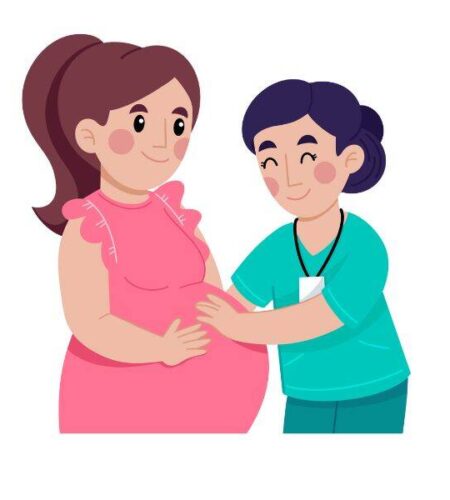In the realm of maternal healthcare, midwives play a crucial role in providing comprehensive care to expectant mothers throughout their pregnancy, labor, and postpartum period. The roles and responsibilities of midwives in maternity care encompass a wide range of tasks, from offering prenatal education and support to facilitating safe and comfortable childbirth experiences. This article delves into the diverse responsibilities shouldered by midwives, highlighting their significance in promoting maternal and infant well-being.
What is a Midwife?
Before exploring the roles and responsibilities of midwives in maternity care, it’s important to understand who midwives are and the specialized care they provide. Midwives are skilled healthcare professionals specializing in supporting women throughout their reproductive journey. They are trained to provide holistic, woman-centered care that emphasizes natural and low-intervention approaches to childbirth.
The Roles and Responsibilities of Midwives in Maternity Care
1. Prenatal Care
During the prenatal period, midwives assume several essential roles and responsibilities to ensure the health and well-being of expectant mothers and their unborn babies. These include:
- Conducting comprehensive initial assessments, including medical history and physical examinations.
- Ordering and interpreting diagnostic tests, such as ultrasounds and blood work.
- Providing prenatal counseling and education on topics such as nutrition, exercise, and childbirth preparation.
- Monitoring the progress of pregnancy, identifying and managing any potential complications.
- Offering emotional support and addressing the concerns and anxieties of expectant mothers.
2. Continuous Labor Support
One of the primary responsibilities of midwives in maternity care is to provide continuous support during labor and childbirth. This involves:
- Assisting women in finding comfortable positions and utilizing relaxation techniques during labor.
- Monitoring maternal and fetal well-being throughout labor, including monitoring vital signs and fetal heart rate.
- Offering encouragement and emotional support to the laboring woman and her support network.
- Providing guidance and assistance with pain management options, including non-pharmacological methods.
- Collaborating with obstetricians and other healthcare providers if medical interventions become necessary.
3. Facilitating Natural Births
Midwives are champions of natural childbirth, focusing on empowering women to have positive and fulfilling birth experiences. Their responsibilities in this area include:
- Advocating for the woman’s birth preferences and ensuring informed decision-making.
- Supporting women in utilizing non-pharmacological pain relief methods, such as breathing techniques and water immersion.
- Assisting with positioning and movement during labor to optimize progress and comfort.
- Monitoring the progress of labor and providing guidance on when to push.
- Encouraging immediate skin-to-skin contact and initiating breastfeeding after birth.
4. Postpartum Care
After the birth of the baby, midwives continue to play a crucial role in providing comprehensive postpartum care to women. Their responsibilities include:
- Conducting routine postpartum assessments, checking vital signs, and evaluating the physical and emotional well-being of the mother.
- Assisting with breastfeeding support and addressing any challenges or concerns.
- Offering guidance on postpartum recovery, including proper nutrition, rest, and self-care.
- Monitoring the newborn’s health, including weight gain, feeding, and overall development.
- Providing emotional support and referring women to additional resources if needed.
FAQs about the Roles and Responsibilities of Midwife in Maternity Care
1. Are midwives only involved in natural births?
No, midwives are trained to support women in a variety of birthing options, including natural births, water births, and births with medical interventions when necessary. They adapt their approach to cater to the individual needs and preferences of the woman.
2. Can midwives perform medical procedures during labor and childbirth?
While midwives primarily focus on low-intervention approaches, they are also trained to perform certain medical procedures, such as administering medications, conducting episiotomies, and managing emergency situations. However, their main goal is to promote the least invasive and most natural birth experience possible.
3. What is the difference between a midwife and an obstetrician?
Midwives and obstetricians have distinct roles in maternity care. Midwives provide holistic, personalized care and emphasize natural childbirth, while obstetricians are medical doctors who specialize in high-risk pregnancies and surgical interventions, such as cesarean sections.
4. Are midwives qualified to provide postpartum care?
Yes, midwives are well-equipped to provide comprehensive postpartum care to women. They address the physical and emotional recovery of the mother, monitor the newborn’s health, and provide breastfeeding support and guidance.
5. Can midwives practice in hospitals and birthing centers?
Yes, midwives can practice in a variety of settings, including hospitals, birthing centers, and even home births. Their scope of practice and level of collaboration with other healthcare providers may vary depending on the specific setting and local regulations.
6. How can I find a midwife for my maternity care?
To find a midwife for your maternity care, you can start by consulting your primary healthcare provider or local healthcare facilities. You can also contact professional organizations such as the American College of Nurse-Midwives (ACNM) for a list of certified midwives in your area.
